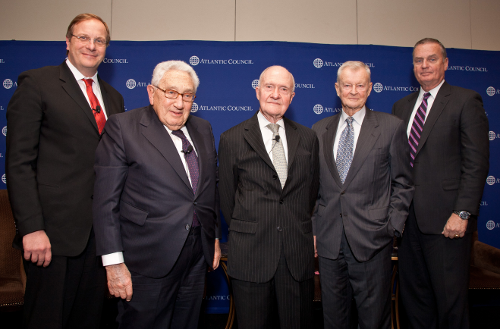 The Envoy
The EnvoyHow Campaign 2012 is endangering the world: the realists’ lament

The silver-haired deans of American statecraft—Henry Kissinger, Brent Scowcroft, Zbigniew Brzezinski, Robert Gates and Jim Jones—gathered this week at a high-profile policy council to lament the inanity of political discourse in this presidential election cycle. They also concurred that the fast-vanishing center of American political debate will likely yield perilous consequences for national-security issues.
"I can't help but think when listening to the presidential debates, how unbelievably ignorant are both the candidates and the public listening to them," Zbigniew Brzezinski, former national security adviser for President Jimmy Carter, told a conference hosted by the Atlantic Council Tuesday to honor former Bush 41 National Security Adviser Scowcroft. "It affects how the world sees us."
"I'm also deeply concerned about the decline of virtues and values . . . when it comes to how we govern and relate to one another here at home," former Defense Secretary Robert Gates later told the forum. (You can listen to the audio of the proceedings here.) "Civility, mutual respect, putting country before self and country before party . . . and not demonizing those with whom we differ . . . . Zero-sum politics and ideological siege warfare are the new order of the day. "
"As a result of these and other polarizing factors, the moderate center, the foundation of our political system, is not holding," Gates said. "So just at a time when this country needs more continuity, more consensus, and above all more compromise, to deal with our most serious long-term problems, most of the trends are pointing in the opposite direction."
The current partisan distemper is "accentuated by a primary season which goes on forever," requiring candidates to play to the base, former Nixon and Ford Secretary of State Henry Kissinger said. "Fifty years ago, candidates asked me what to think. Now they ask me what to say. Those are two major problems."
The elder statesmen outlined a series of looming threats and convulsions that could upend the world order. As the global scene undergoes fundamental changes—the European debt crisis, the rise of China, the Arab awakening revolutions, and growing signs of strain on America's global military predominance--they argued, growing Washington gridlock, dysfunction and partisan demagoguery narrow the options for American leaders to manage such profound shifts--or even to think strategically about them.

"We live in a situation in which the familiar circumstances are fundamentally changing in every region of the world at the same time—but not for the same reasons," Kissinger said. "They are changing in Europe because European sovereignty is unable to take care of the problems for which the Westphalian model [of nation-states] was formed. They are changing in Asia because of the emergence of China as a risking power . . . . They are changing in the Middle East where a revolutionary series of events is taking place.
"All of it is occurring as the U.S. is obliged to alter the post-war pattern of being the predominant superpower," Kissinger said, citing recent U.S. troop withdrawals and military retrenchments.
"The bottom line: We are in for a period now of tumult, turmoil, confusion in the world, which we are not able to manage," Brzezinski said. "There is growing pressure on the U.S. to get sucked into issues that reduce the choices. It's very dangerous. "
"I am particularly concerned about the escalation in rhetoric and the narrowing of options regarding Iran," Brzezinski added. "If we slide into a conflict, the consequences will be disastrous, for us and on a global scale. There would be a possibility of a massive breakdown in the international system, and the global economy."
"We must galvanize the public to understand this problem," he contended. But "our public is driven by fear, ignorance, demagogy. It has a paralyzing effect on intelligent management of the current era."
Other popular Yahoo! News stories:
Want more of our best national security stories? Visit The Envoy or connect with us on Facebook and on Twitter.
